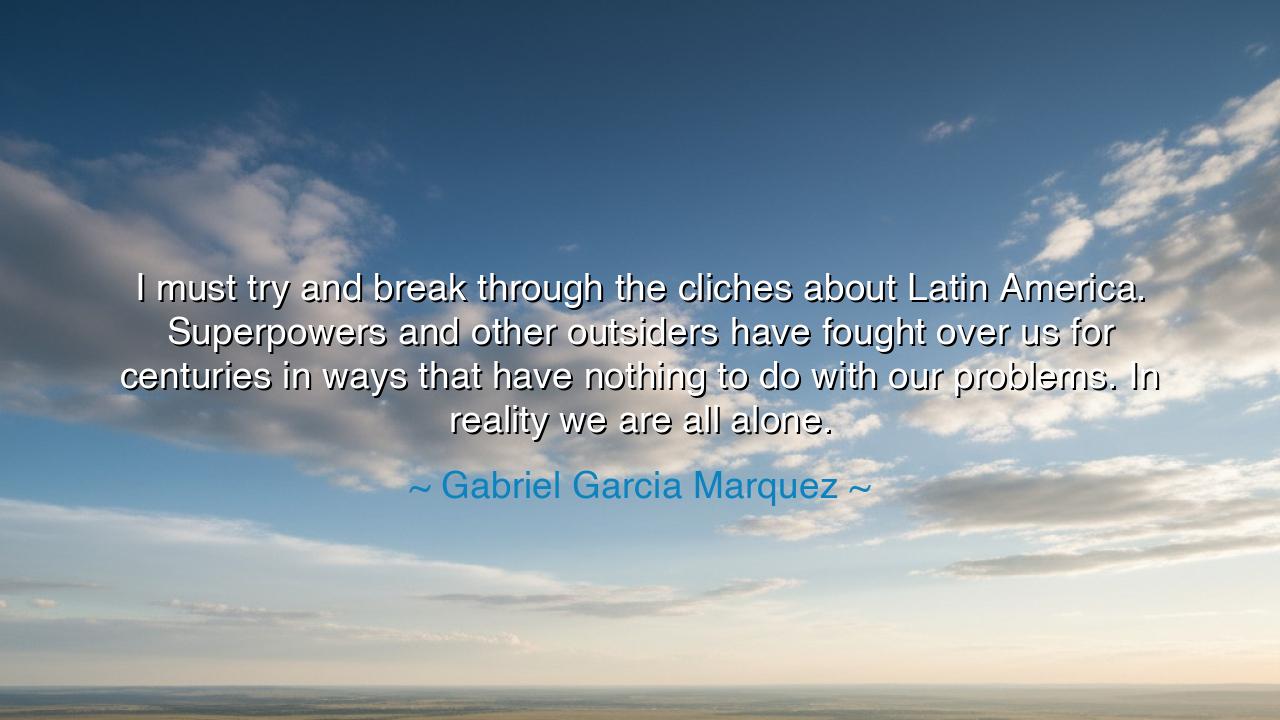
I must try and break through the cliches about Latin America.
I must try and break through the cliches about Latin America. Superpowers and other outsiders have fought over us for centuries in ways that have nothing to do with our problems. In reality we are all alone.






In the voice of the wise and the mournful, Gabriel García Márquez once declared, “I must try and break through the clichés about Latin America. Superpowers and other outsiders have fought over us for centuries in ways that have nothing to do with our problems. In reality we are all alone.” These words, born not of despair but of fierce clarity, echo across the mountains and jungles of the southern world. They are the cry of a continent that has been misunderstood, romanticized, and divided—its soul reduced to stories told by those who never walked its earth. In his lament, Márquez called for liberation not only from foreign domination, but from the chains of imagination that the world had forged around his homeland.
For centuries, the lands of Latin America have been treated not as living nations, but as territories to be possessed, resources to be plundered, myths to be written by others. From the conquistadors who arrived bearing the cross and the sword, to the cold powers of the modern age who sought influence through gold, oil, and politics—outsiders have carved upon this continent their own ambitions. But none of these struggles were waged for the heart of the people. They were waged for control, for wealth, for power. And so, as Márquez says, the true struggles of Latin America—poverty, identity, dignity—remained unsolved, unseen, our own battles to fight alone.
Yet in that solitude, there is also strength. When the voices of empires fade, what remains is the murmur of the people—the weavers, the poets, the farmers, the mothers who carry both sorrow and song. Márquez himself, in his novels of magical realism, gave voice to this spirit. In One Hundred Years of Solitude, he spoke of Macondo, a town cursed and blessed by its own dreams, forgotten by the world. It was a mirror of Latin America: full of beauty, tragedy, and unyielding life. Through his art, Márquez sought to break the clichés, to show the world that this continent was not a stage for foreign fantasies, but a living realm with its own magic and misery intertwined.
Think, for a moment, of the story of Simón Bolívar, the Liberator. He dreamed of a united Latin America, one people bound not by the chains of conquest but by shared destiny. Yet even he, at the end of his life, murmured, “He who serves a revolution ploughs the sea.” His dream was betrayed by division, by greed, by the lingering shadow of foreign power. The loneliness Márquez speaks of is not only political—it is spiritual. It is the loneliness of those who fight for their soul in a world that has already decided what they are supposed to be.
But solitude, when embraced with courage, becomes a forge. It burns away illusions and leaves the truth shining like tempered steel. Márquez understood that Latin America must tell its own story—not as a footnote to Europe or America, but as the heart of its own mythos. To break through the clichés means to reclaim the power of self-definition, to refuse to be seen through foreign eyes, to say: We exist, and we will name ourselves. This is not only the calling of a continent; it is the calling of every soul who has been misunderstood, every culture that has been silenced.
And so, the lesson to be carried forward is this: beware the stories others tell about you. Nations, like people, are often imprisoned not by chains, but by narratives. To live truthfully, one must see oneself without distortion, to stand in the solitude of honesty, even when the world looks away. The young must learn not to imitate the voices of the powerful, but to speak with their own tongues, to build their futures upon their own soil. For only when a people understand their own worth can they stand firm amid the tides of history.
Therefore, let the children of Latin America—and all lands that have known conquest—rise from the ruins of misrepresentation. Let them write, paint, build, and dream in their own names. Let them tell stories not of how others have seen them, but of what they have seen themselves. For the solitude that Márquez speaks of is not a curse—it is a sacred space, a womb of rebirth, where nations and souls alike can rediscover who they are.
And to all who hear these words: when the world misunderstands you, do not despair. Stand tall in your solitude. Let it teach you, temper you, and make you whole. For in that silence, you will find the same truth Márquez found—that though we are all alone, the heart that dares to define itself is never truly lost.






AAdministratorAdministrator
Welcome, honored guests. Please leave a comment, we will respond soon